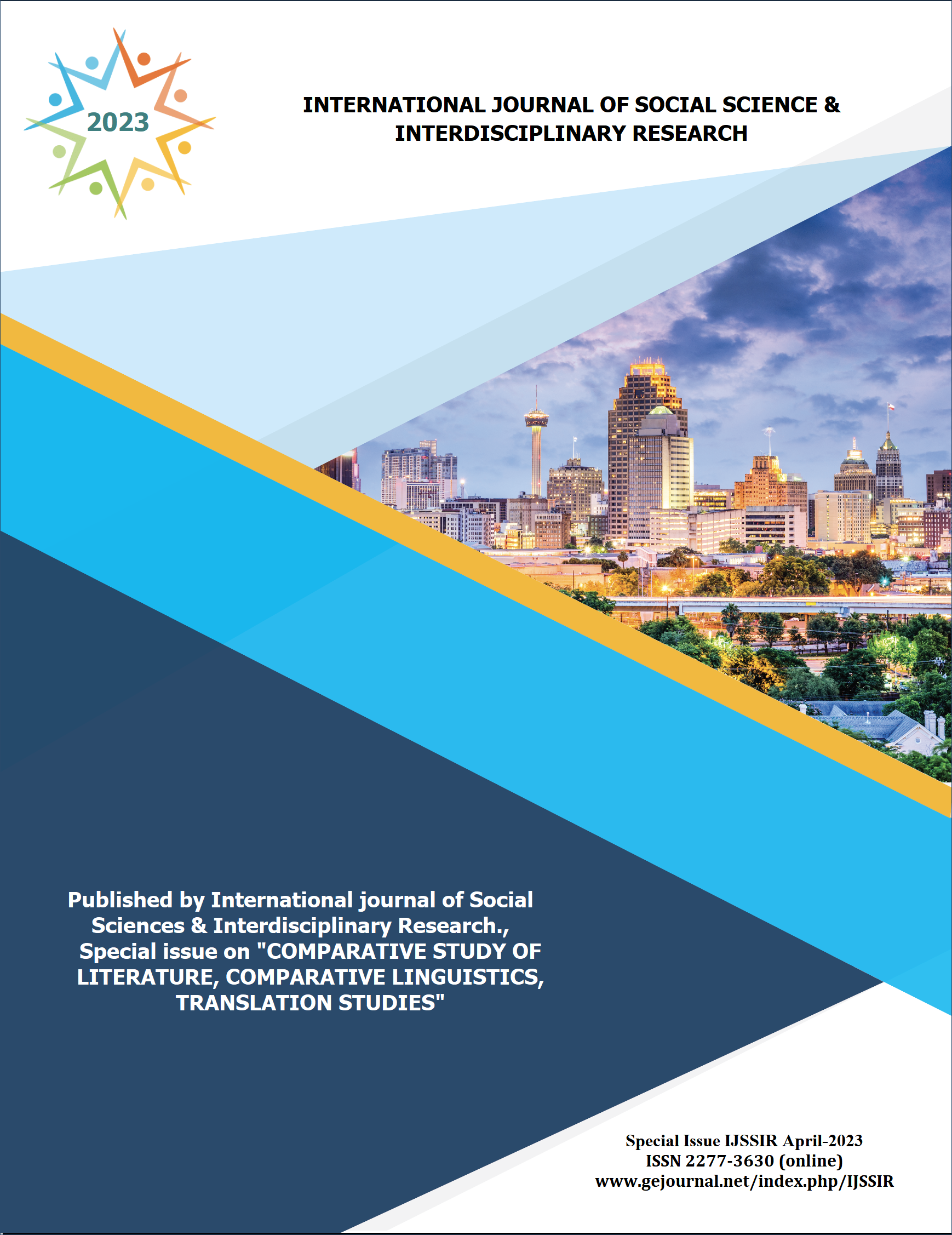LEXICO-SEMANTIC FEATURES OF MODAL VERBS IN FAIRY-TALES (ON THE EXAMPLE OF ENGLISH AND UZBEK FAIRY-TALES)
Keywords:
Fairy tales, lexical resources, lexical-semantic features, modal verbs, similarity, vocabulary usage, Uzbek, English languages.Abstract
The general concept of modality is deeply rooted in philosophy. This idea refers to the interaction between the world and its comprehensive expression. Since language is a means of expressing modality, both linguists and philosophers of language have paid serious attention to this issue. The main focus of the research is on the extremely broad category of modality in linguistics, which reflects different aspects of communication. In this study, the lexical-semantic features of modal verbs in fairy tales (in the case of English and Uzbek fairy tales) are studied.
References
Jeana Jorgensen. Fairy Tales 101: An Accessible Introduction to Fairy Tales. Fox Folk Press, 2022. 372 pages. ISBN 979-8985159233.
Bettelheim, Bruno (1989). The Uses of Enchantment: The Meaning and Importance of Fairy Tales, wonder tale, magic tale. New York: Vintage Books. pp. 25. ISBN 0-679-72393-5.
Thompson, Stith. Funk & Wagnalls Standard Dictionary of Folklore, Mythology & Legend, 1972 s.v. "Fairy Tale"
Martin, Gary. "'Fairy-tale ending' – the meaning and origin of this phrase". Phrasefinder.
Orenstein, p. 9.
Gray, Richard. "Fairy tales have ancient origin". The Telegraph 5 September 2009.
BBC (20 January 2016). "Fairy tale origins thousands of years old, researchers say". BBC News. BBC. Retrieved 20 January 2016.
Erin Blakemore (20 January 2016). "Fairy Tales Could Be Older Than You Ever Imagined". Smithsonion. Retrieved 4 March 2019.
Khusainova Leyla, Mamatkulova Komila. (2021). Communicative Competense and Ways to Reach it in Teaching Foreign Languages. Annals of the Romanian Society for Cell Biology, 7098–7109.
Juraeva, M. M. (2017). Linguocognitive, national and cultural features of the category of modality in French and Uzbek fairy tales. Tashkent. 233/253 p.(Diss. filol. fan. dok.).
Jurayeva, M. M. (2016). Linguocognitive, national-cultural features of the modality category in French and Uzbek fairy tales. Dis. abs. doc. phil. sci. Tashkent.
Жўраева, М. М. (2017). Француз ва ўзбек эртакларида модаллик категориясининг лингвокогнитив, миллий маданий хусусиятлари: филол. фан. докт.... дисс. автореф. Филология фанлари доктори илмий даражасини олиш учун тақдим этилган диссертация.
Juraeva, M., & Bobokalonov, O. (2020). Pragmalinguistical study of french-uzbek medicinal plant terminology. Electronic journal of actual problems of modern science, education and training: Modern problems of philology and linguistics, 6(1).
Juraeva, M. M. (2015). 333 virelangues, poesies, devinettes.
Juraeva, M. M., & Nosirova, D. M. (2014). Le sport et la vie saine.
Juraeva, M. M., & Khamidova, M. K. (2020). LINGUOCULTURE AND LINGUOCULTUREME. Scientific reports of Bukhara State University, 3(4), 111-114.
Juraeva, M. M. (2017). Linguocognitive, national and cultural features of the category of modality in French and Uzbek fairy tales. Tashkent. 233/253 p.(Diss. filol. fan. dok.).
Mukhammadovna, J. M. (2016). The national, cultural and linguocognitive peculiarities of modality of the french and uzbek fairytales. GIF. LangLit. An International Peer-reviewed Open Sccess Journal, 3(2), 81-86.
Juraeva, M. M. (2014). Receils of proverbs.
Juraeva, M. M. (2016). Linguocognitive, national and cultural features of the category of modality in French and Uzbek fairy tales.(monograph).
Juraeva, M. M. (2014). Receils de la poesiefrancaise.
Muhamadovna, J. M. (2019). Theoretical views of concept, frame, tale-concept, tale-frame in cognitive linguistics. International Journal of Engineering and Advanced Technology, 8(5 Special Issue 3), 392-395.
Juraeva, M. M. National-cultural similarities of uzbek and french folk tales. JCC Impact jounals (ISSN (P): 2374-4564) International Journal of Research in Humanities, Arts and Literature. V. 3, Issue-2. IJRHAL. 2015.–P. 51–56.
Juraeva, M. M. (2020). CATEGORY OF MODALITY: RESEARCH AND INTERPRETATION. Theoretical & Applied Science, (6), 149-154.
Juraeva, M. M. (2017). Linguocognitive, national and cultural features of the category of modality in French and Uzbek fairy tales.(Avtoref. diss. filol. fan. dok.).
Juraeva, M. M., & Nosirova, D. M. (2014). Le sport et la vie saine.(p. 176).
Juraeva, M. M. (2014). Receils de la poesiefrancaise.(Collection of poems).
Juraeva, M. M. (2014). Receils of proverbs.(Collection of proverbs, English, French, Russian and Uzbek).
Juraeva, M. M. (2014). Receils of proverbs.(p. 170). Bukhara.(Collection of proverbs, English, French, Russian and Uzbek).
Downloads
Published
How to Cite
Issue
Section
License
Copyright (c) 2023 GEJournals

This work is licensed under a Creative Commons Attribution-NonCommercial-NoDerivatives 4.0 International License.





